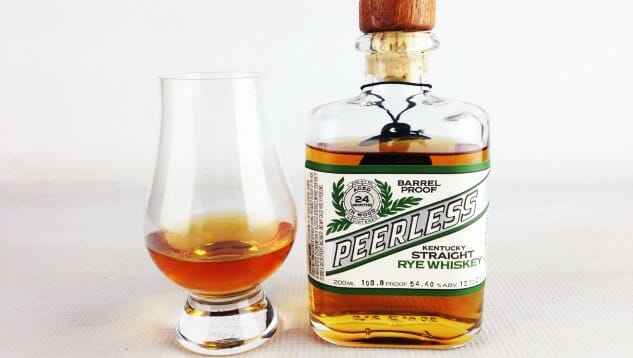The concept of “value” is awfully nebulous in the whiskey world. At least among the products coming out of big, well-established distilleries, there are reliable measuring sticks that one can use. For $25, for example, you can get a bottle of Elijah Craig Small Batch on the bourbon side, or Rittenhouse on the rye side of the equation. The reliable existence of/access to these products is the primary factor in terms of implanting ideas of value in the head of the consumer. On some level, if you’re a bourbon priced above $25, you have to prove you’re worth that upgrade from the Elijah Craig. And if you’re a rye with a price tag greater than $25, you’re in direct competition for a value comparison with the likes of Rittenhouse or Bulleit Rye.
That works, more or less, when talking about the big distilling companies on the market. But what about independent micro-distillers? That’s another ball of wax. How much is novelty worth? Or the knowledge that a distillery is employing more expensive, esoteric techniques that don’t necessarily translate to obvious differences in flavor? Or a few extra percentage points on an ABV?
Typically, those types of questions don’t really enter very much into one of my reviews at Paste. But typically, I’m not reviewing a two-year straight rye whiskey that retails for $125. So yeah—here, these questions are relevant.
The whiskey in question is Peerless Kentucky Straight Rye Whiskey. It’s a new-ish product from Kentucky Peerless Distilling Co., a microdistiller producing tiny batches of cask strength rye whiskey (bourbon on the way in 2019), and doing so in a few ways that are unusual. The first oddity is their use of exclusively “sweet mash” rather than the almost universal sour mashing process, meaning that they’re essentially using fresh batches of yeast for every mash, rather than using previously soured mash to achieve consistency. Secondly, Peerless is devoted to a low barrel entry proof process for their rye, meaning that the liquid enters the newly charred barrel at a lower proof and then isn’t cut with water afterward. This has the effect of making the “cask strength” release only about 107 proof, barely stronger than most bottled in bond releases. Both of these processes are not exactly common in the industry, and they likely contribute on some level to the price tag.
Sporting an “aged 24 months in wood” sticker, it feels like the brand is well aware that its lack of age will be a talking point, considering the price point. Conveying age in months rather than years simply isn’t the kind of thing that instills confidence in someone browsing the liquor aisle, and it’s probably not the best idea.
But enough talk. Let’s actually appraise the liquid here.
On the nose, Peerless Rye conjures an interesting melange of flavors. I’m getting a lot of herbal and green notes on this young rye, with lots of pine, dill and a fresh, grassy note. Light brown sugar sweetness and some corny sweetness suggest a decent amount of corn in the mash bill, met by sawdust-like wood notes. Apple fruitiness combines with a quality that is almost saline—seawater-esque, finishing with some slightly stinging alcohol.
On the palate, this rye is spicy and clearly on the younger side, with a fairly assertive alcohol presence. The “woodsy,” floral and piney notes remain, supplement with notes of stone fruit, corny sweetness and brown sugar. Spices convey cinnamon and a bit of anise/molasses cookie, with moderate sweetness. Oddly, it seems like the flavors taper off rather quickly, leaving a neutral (but long-lasting) alcohol burn. I’m rather surprised in general that the booze seems quite as assertive as it is—it certainly feels like a rougher alcohol presence than in the similarly proofed Maker’s Mark Private Select we recently sampled.
Regardless, this is both a flavorful and intriguing two-year rye. If someone handed me a glass of Peerless, despite it showing some of its youth, I would think it had more age on it than two years. Told that this was a two-year rye in a blind tasting, I would give it congratulations.
However. If I was then told I would be paying $125 for a bottle of that rye, I would say “no way is that happening.” Yes, there must be some concession made when a product like this is coming from a microdistillery rather than a major producer, but when your rye is in a rarified price tier, it has to at least be compared against comparable products. Peerless has made an enjoyable whiskey, but even if you cut its price tag in half, it would still face tough competition from the likes of Pikesville 6 Year Rye, which retails at $50 and even has a slightly higher proof, while being three times as old. It’s asking a whole lot of the consumer for them to overlook that.
Reportedly, there are stocks of Peerless still being aged, which presumably will lead to 4 and 6-year versions of the rye down the line. Judging from the 2-year, there’s genuinely a possibility that those ryes will be really great, but how much will they cost? If $125 is just a starting point, will you be expected to shell out $200 for a bottle of 4-year rye? Who’s looking at that, next to a bottle of Hochstadter’s 16 Year Rye or WhistlePig 15 Year, and choosing the former rather than the latter?
I’m not sure. But if money is no object, by all means, go right ahead.
Distillery: Kentucky Peerless Distilling Co.
City: Louisville, KY
Style: Kentucky straight rye whiskey
ABV: 53.5% (107 proof)
Availability: 750 ml bottles, $125 MSRP
Jim Vorel is a Paste staff writer and resident brown liquor geek. You can follow him on Twitter for more drink writing.
